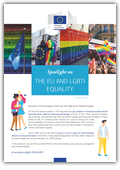Spotlight on LGBTIQ equality strategy
LGBTIQ stands for lesbian, gay, bisexual, trans, intersex and queer/questioning. This and other related terms stand, in essence, for people who, sadly, often face bias-motivated discrimination in their everyday life, simply due to their sexual orientation, despite the EU Charter of Fundamental Rights explicitly prohibiting this. Even worse, LGBTIQ people often experience hate crime and violence. They may be attacked in the street just for holding hands with their partner or they may be bullied or isolated at school just for who they are.
In early 2019, the European Parliament called on the European Commission to adopt a strategy to foster equality for LGBTI people. Later in the same year, the Finnish Presidency of the Council organised a high-level conference to identify priorities for 2020 and beyond on the issue. Building on this and on lessons learnt in previous actions to advance equality, a few days ago the European Commission presented its first-ever EU strategy on LGBTIQ equality.
The LGBTIQ community and human-rights defenders are looking to the EU to continue to be a clear and strong voice against hate and discrimination and to remain a force for change beyond its borders by setting standards.
Our November newsletter brings together publications on this and other interesting topics, notably including the COVID-19 pandemic that is stressing our societies and health systems through its second wave.
|

|
PDF/Paper |
|
Since 1999, the EU has had the power to act in cases of discrimination based on sexual orientation, and has adopted legislation and measures to extend legal and social protection for LGBTI people. In this brochure you can find out what the EU has already done for lesbian, gay, bisexual, transgender and intersex people. |
Available in all the official languages of the EU |

|
PDF |
|
|
In its conclusions on LGBTI equality in June 2016, the Council called on the Commission to report every year on the implementation of the list of actions to advance LGBTI equality. This fourth and final report outlines the actions implemented in 2019 and reflects on the achievements, experiences and lessons learned from 5 years of dedicated policy work. |
Available in English |
 |
PDF |
|
|
This report presents selected findings from the 2019 survey of the European Union Agency for Fundamental Rights on LGBTI people in the EU, North Macedonia and Serbia. With almost 140 000 participants it is the largest survey of its kind, and follows the agency’s first survey on this subject in 2012. It concludes that achievements remain modest and discrimination persists in everyday life – at work, at cafés and in restaurants, when looking for housing or when accessing healthcare. |
Available in English |
More on this topic |
 |
PDF |
|
|
This is the original list of actions to advance LGBTI equality presented by the Commission to the Council and the European Parliament in December 2015. It was the response of the Commission to a European Parliament resolution and a joint call from Member States to step up efforts to combat discrimination based on sexual orientation and gender identity. |
Available in English |

|
DATASET |
|
|
This dataset contains the results of a survey focussing on people’s perceptions, attitudes and opinions of discrimination based on ethnic origin, skin colour, sexual orientation, gender, age, disability, religion and beliefs. The data show that, compared to 2015, fewer EU citizens now perceive discrimination as being widespread in their country. However, perceptions, opinions and attitudes still vary widely depending on the group discriminated against, and also from country to country. |
Available in English |
COVID-19
 |
PDF |
|
Public opinion in times of covid-19 |
‘Uncertainty’: this is the emotional status most commonly shared by EU citizens during the COVID-19 pandemic. While 50% of respondents stated that ‘uncertainty’ best describes their mood, ‘hope’ already comes in second place, with 41% of respondents across the 21 Member States surveyed citing this feeling. Find out more interesting trends in this publication, which explores the public opinion of Europeans in the time of the pandemic. |
Available in English |

|
PDF |
|
|
Since the coronavirus began its spread across the world, many analysts have speculated about its impact: would it merely accelerate previously existing trends, or would it prove to be a geopolitical game changer, creating a world profoundly different from before? The answer is much more complex than simply either/or: the world during and after COVID-19 will have elements of both the old and the new, the known and the unknown. This study explores both dimensions of the pandemic’s impact: how it affects the geopolitical context it erupted into, and what possibility space it opens up. |
Available in English |

|
PDF/Paper |
|
|
Read here about the findings of the ‘Living, Working and COVID-19’ e-survey, carried out to capture the far-reaching implications of the pandemic for the way people live and work across Europe. |
Available in English |
Research and innovation |

|
PDF/Paper |
|
|
Every month, the Research*eu magazine brings you the results of EU-funded research and innovation. This month’s special feature focuses on soil: an absolutely fundamental component of the environment, performing vital ecological, social and economic functions |
Available in English
(Individual article also available in English, French, German, Italian, Polish and Spanish on the CORDIS website)
|

|
| PDF |
|
|
The European population is ageing, raising concerns about the fiscal sustainability of many European welfare states in the coming decades. Understanding the impact of migration on the public resources is fundamental for ensuring that European welfare systems remain fiscally sustainable in the long run, as a young migrant population could balance the effects of a shrinking working age population in the EU. This study projects the net fiscal contribution of migrants to the EU up to 2035, finding that migration can mitigate but not offset the negative effects that a steadily ageing population will have on many European welfare states. |
Available in English
|
You may also like |
 |
PDF |
|
|
Why do we need an EU budget? How big is it and who makes the decisions about it? Click here to find straightforward answers to these questions and more about the EU budget. |
Available in all the official languages of the EU except Irish |
 |
PDF/Paper |
|
|
What is pollution? Where does it come from? How does pollution affect the environment and how does it affect people’s health? How can Europe move towards zero pollution, in line with the ambition of the European Green Deal? This publication looks at pollution through different angles related to the work of the European Environment Agency and EU legislation. |
Available in English |

|
PDF/Paper |
|
The shape of things to come |
This paper seeks to provide readers with ambitious foresight analysis and insights on how to be prepared for unexpected twists and turns in Russia’s future trajectory up to the horizon of 2030. It offers analytical insights in what may shape the country's path in the upcoming decade, and explores how a number of critical uncertainties may have a significant impact on Russia's trajectory. |
Available in English |
Our news |
|
|
Join Endorse: the EU Data Conference on Reference Data and Semantics
Knowledge sharing is the driving force of digital transformation and a challenge. The Endorse conference aims to provide a platform to discuss and shape the future of data management in public services by bringing together international experts in the fields of digitalisation, semantics, reference data and knowledge management. Join us to have your voice heard and be part of an active and forward-looking community! The event will take place online in four half-day sessions from 16 to 19 March 2021.
Registrations are already open. Book your place soon!
|
|
|
